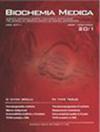Post-collection acidification of spot urine sample is not needed before measurement of electrolytes
IF 1.8
3区 医学
Q1 MEDICAL LABORATORY TECHNOLOGY
引用次数: 0
Abstract
Introduction Kidney stone formers can have higher oxalate and phosphate salt amounts in their urine than healthy people and we hypothesized that its acidification may be useful. The study aims to compare results of urine concentrations of calcium, magnesium, and inorganic phosphorus in the midstream portion of first voided morning urine samples without (FMU) and with post-collection acidification (FMUa) in kidney stone patients. Materials and methods This is a prospective single center study. A total of 138 kidney stone patients with spot urine samples were included in the study. Urine concentrations of calcium, magnesium and inorganic phosphorus were measured with and without post-collection acidification. Acidification was performed by adding 5 µL of 6 mol/L HCl to 1 mL of urine. Results The median age (range) of all participants was 56 (18-87) years. The median paired differences between FMU and FMUa concentrations of calcium, magnesium, and inorganic phosphorus were: - 0.040 mmol/L, 0.035 mmol/L, and 0.060 mmol/L, respectively. They were statistically different: P < 0.001, P < 0.001, P = 0.004, respectively. These differences are not clinically significant because biological variations of these markers are much higher. Conclusions No clinically significant differences in urinary calcium, magnesium, and inorganic phosphorus concentrations between FMU and FMUa in patients with kidney stones were found.在测量电解质之前,不需要对点尿样本进行采集后酸化
肾结石患者尿液中的草酸盐和磷酸盐含量可能高于健康人,我们推测其酸化可能是有用的。该研究旨在比较肾结石患者首次晨尿标本中游部分钙、镁和无机磷的浓度,其中未进行(FMU)和采集后酸化(FMUa)。材料与方法本研究为前瞻性单中心研究。本研究共纳入138例有尿样的肾结石患者。尿液中钙、镁和无机磷的浓度分别在采集后酸化和不酸化的情况下测定。酸化是在1 mL尿液中加入5µL 6 mol/L的HCl。结果所有参与者的年龄中位数(范围)为56岁(18-87)岁。FMU和FMUa钙、镁和无机磷浓度的中位数配对差异分别为- 0.040 mmol/L、0.035 mmol/L和0.060 mmol/L。差异有统计学意义:P < 0.001, P < 0.001, P = 0.004。这些差异在临床上并不显著,因为这些标记物的生物学变异要高得多。结论FMU与FMUa在肾结石患者尿钙、镁、无机磷浓度方面无临床显著差异。
本文章由计算机程序翻译,如有差异,请以英文原文为准。
求助全文
约1分钟内获得全文
求助全文
来源期刊

Biochemia Medica
医学-医学实验技术
CiteScore
5.50
自引率
3.00%
发文量
70
审稿时长
>12 weeks
期刊介绍:
Biochemia Medica is the official peer-reviewed journal of the Croatian Society of Medical Biochemistry and Laboratory Medicine. Journal provides a wide coverage of research in all aspects of clinical chemistry and laboratory medicine. Following categories fit into the scope of the Journal: general clinical chemistry, haematology and haemostasis, molecular diagnostics and endocrinology. Development, validation and verification of analytical techniques and methods applicable to clinical chemistry and laboratory medicine are welcome as well as studies dealing with laboratory organization, automation and quality control. Journal publishes on a regular basis educative preanalytical case reports (Preanalytical mysteries), articles dealing with applied biostatistics (Lessons in biostatistics) and research integrity (Research integrity corner).
 求助内容:
求助内容: 应助结果提醒方式:
应助结果提醒方式:


